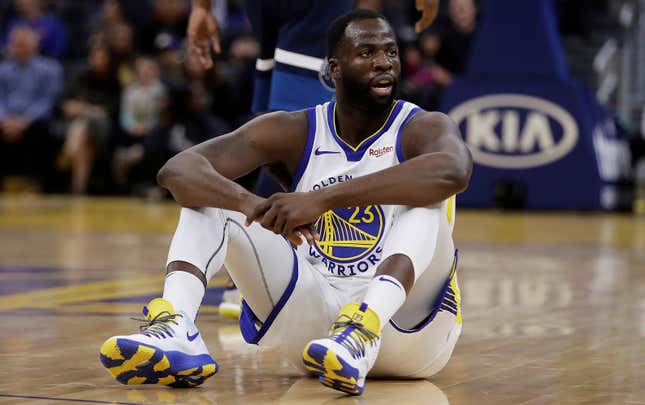
Draymond Green was ostensibly talking about Marquese Chriss. The 22-year-old forward is with the Warriors in preseason on a non-guaranteed contract, but Stever Kerr says Chriss has been the “surprise of camp,” and with Golden State dealing with injuries to its other big men, Chriss seems likely to make the team. But Green had larger things on his mind, and used Chriss as an example of how he believes that when a player doesn’t pan out, it’s often not that player’s fault.
“I don’t think there was ever a doubt that he was a legitimate NBA player,” Green told reporters after Wednesday’s preseason loss to the Lakers, in which Chriss scored eight points and grabbed four rebounds in 25 minutes with an unrecognizable Warriors lineup.
“I think everyone was just waiting for [Chriss] to turn that corner,” Green continued, “and he seems like he’s turned the corner. But I think he’s been in some pretty tough situations. No one ever blames the situation, it’s always the kid. No one ever blames the shitty franchises. They just always want to blame the kid. It’s not always the kid’s fault. I’m happy he’s got an opportunity to show what he can really do. He’s a prime example. But no one still is going to blame any organizations, it’ll always be the kid’s fault, and it’ll be the next kid the come’s fault and the next kid after that.”
Chriss, the eighth overall draft pick out of Washington in 2016, is a hell of a test case. He’s basically never been put in position to succeed, so there’s no way to say whether his early-career struggles are his own fault, or if he’s been ruined by the irrepressible taint of Phoenix. The Suns acquired him in a draft-night trade, and he spent two seasons in that wilderness. Last year he split time between Cleveland and Houston, barely getting off the bench. He was, by then, a bona fide draft bust—up until the Warriors decided he didn’t have to be.
It’s difficult if not impossible to separate a player from his situation. There’s no control group for the experiment, and no alternate universe to see what would have become of Chriss if he had spent his first three NBA seasons with a functional franchise, one that wins at least as often as it loses, where players don’t hate each other and management, and where he wouldn’t be asked to carry a bad team but could instead actually focus on, you know, getting better. Chriss going to the Warriors at just 22 years old might be the closest we can get to empirical evidence in the NBA’s nature vs. nurture debate.
Now, we all know this, on a fundamental level—that it’s certainly not always a player’s fault, and maybe not even usually. So why does the label of “draft bust” continually get affixed to players more firmly than to the teams that keep busting them? Draymond’s got an answer for that one, too: it’s the media.
“Because you’re friends with them,” Green said. “And you want all the access from them. So the way you guys will come out and bash players, you don’t do that to organizations because it’s all about access and protecting your future. No one really protects these younger guys’ future because it’s all about what can I do for myself. So no one talks about the organizations. It’s always just the player, player, player because they can’t do shit about it but be young and their name carries no weight and then be out of the league and onto the next thing. So that’s what I think it is. No Phoenix writer is going to bash the Phoenix Suns. But let’s be frank about it: When he was there, the organization was terrible. Everything was going wrong, but he get blamed like he’s the problem. When he left, ain’t nothing go right.”
There’s truth in this. After a losing season, a local beat writer has to come back the next year and have a working relationship with a GM. That writer will never have to speak to the waived young player ever again. The same goes for national hoops writers, to a slightly lesser extent. This generally isn’t intentional or malicious, just a reality of an industry where coaches and front office types and reporters have longer careers than players.
So what’s there to be done about skewed perceptions of young players who don’t live up to expectations? Just keep in mind, I guess, that so much more goes into career success than just individual talent. Green’s out here raising awareness. And if Chriss can be a useful player for the Warriors, it’ll be a heartening message that there is life after Phoenix.